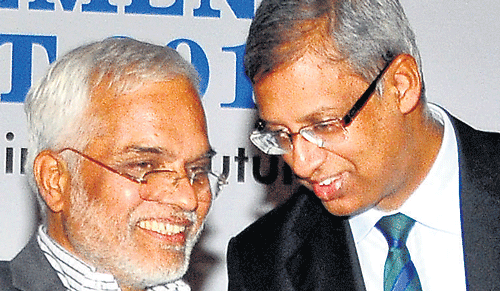
Karnataka State Pollution Control Board (KSPCB) chairman Vaman Acharya on Thursday said the KSPCB is mulling over filing criminal cases against those municipalities that are unable to manage their waste properly.
Not mentioning the erring municipalities in the specific districts of the state, Acharya stated that BBMP will not be included in this. "In order to strictly enforce the waste segregation, the municipalities will be penalised to ensure that waste management is done properly,” he said at the inaugural session of the two-day Waste Management Summit 2013, which started here on Thursday.
Acharya said that it is not a question of technology but changing the mindset of the people. “Organic waste from Bangalore can provide fertilisers for five to six districts around the City. We have been holding meetings with farmers and BBMP on providing waste to farmers and they have always been willing and enthusiastic. However, plastic in organic waste will make it unusable. Although BBMP is working on this through door to door collection, it is not very successful because the waste often gets mixed in lorries," he said.
Acharya and other experts who spoke at the summit opined that waste management should be a social responsibility first and then a business proposal. “Waste management should be seen as a social responsibility first. By creating more awareness through schools across Karnataka, our department succeeded in bringing down the waste during Ganesha festival and use of crackers by 60 per cent during Deepawali. ”
“The current standards of the west are not suitable for India. Our garbage contains 60 per cent organic matter and only five per cent plastic, which is not suitable for producing value products. We are putting more energy to get less energy out of garbage. With a little more effort and spending, pharma industry can convert hazardous materials into non-hazardous ones.”
Referring to industrial polluting units, he said 32 cases have been booked across the state againstpolluting industrial units and three units have also faced closure for the same reason. Acharya released a manual – “In pursuit of Green Excellence- Vol: 3” containing best environmental practices from Indian companies.
Speaking about bio medical waste generated by the hospitals across the State, experts felt that given the amount of bio medical waste generated in our country, at least 700-800 facilities including incinerators are required to dispose off the waste. However, presently, we have only 180 such facilities. “There is a greater need to set up these facilities, may be on PPP mode to tackle the problem of bio-medical waste,” said Dr B Sengupta, former member secretary of the CPCB.
S Mani, chairman, Industrial Waste Management Association, said: “If we follow the fundamental principles of nature, sustainability follows. Many things of e-waste are being scattered on earth. The materials used in such things were formed billions of years ago and will not get back into earth like agro waste.”
Ram N Agnihotri, chairman, Waste Management Summit 2013 and head, Hazardous Waste Management and BMW Ramky Enviro Engineers Ltd, said: “Only 30 per cent of the industry has good waste management processes. And only 10 per cent are taking steps towards zero waste discharge. Rapid development resulted in generation of hazardous and non-hazardous waste. Integrated solid waste management concept should be incorporated into manufacturing processes,” he added.